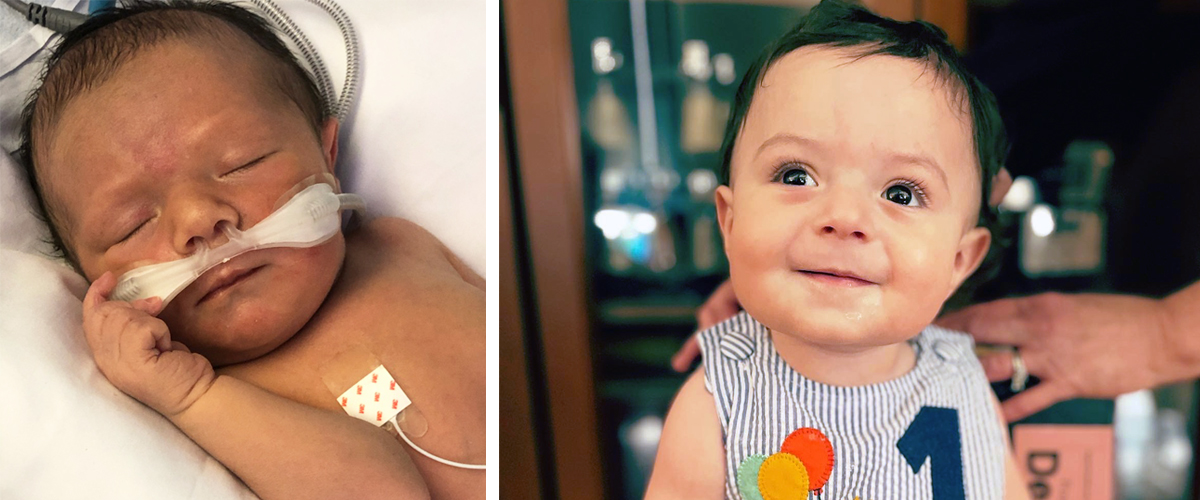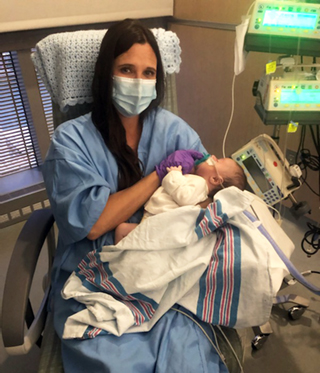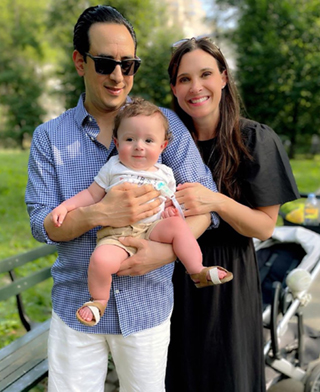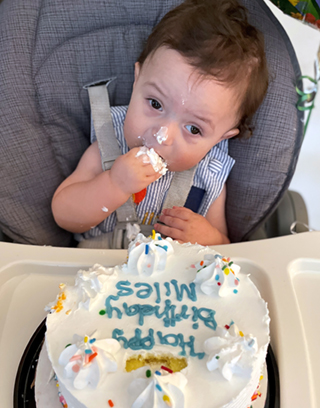“The Ultimate Gift”: A Young Patient Gets a Second Chance at Life
Born with a rare blood vessel condition in his brain, baby Miles had a difficult start to life, but overcame the odds with the help of his dedicated parents and care team.

Few moments in life are as special as the first time parents get to meet their newborn baby. For Amy and AC Rizzo, that moment with their son Miles in July 2020 was over in the blink of an eye.
“I never got that moment with him at the beginning to hold him,” Amy recalls.
Miles was not breathing. As soon as he was born, he needed to be intubated and admitted to the neonatal intensive care unit (NICU) at NewYork-Presbyterian/Weill Cornell Medical Center. (He was later transferred to the newly opened NewYork-Presbyterian Alexandra Cohen Hospital for Women and Newborns.)
Initial tests showed he had pulmonary hypertension, but a subsequent ultrasound and MRI revealed a rare condition called a vein of Galen malformation.

It was an up-and-down journey for Amy and Miles in the NICU, where he spent the first 182 days of his life.
“You’re dealing with something that is really among the rarest things that we see as physicians,” says Dr. Jared Knopman, director of Cerebrovascular Neurosurgery and Interventional Neuroradiology at NewYork-Presbyterian/Weill Cornell Medical Center. “Many neurosurgeons will see maybe one vein of Galen malformation in their career. There’s a lot more unknown about it than known.”
Diagnosed in about 1 in 3 million fetuses, infants, and young children, a vein of Galen malformation disrupts blood flow from the brain to the heart. The network of capillaries that normally eases the pressure of blood flowing from arteries to veins is missing, resulting in a rush of blood directly to the vein of Galen with enough force to lead to organ failure.
“All that blood begins to feed back on the heart and the lungs. Patients go into heart failure, they go into pulmonary failure, they start having changes in their brain that can cause strokes,” explains Dr. Knopman, who is also an assistant professor of neurological surgery at Weill Cornell Medicine.
A Long Road
Given the multiple organs affected by the vein of Galen malformation, Miles’ treatment plan required a collaborative effort by a multidisciplinary team of providers across specialties throughout NewYork-Presbyterian/Weill Cornell Medical Center — in pediatric neurosurgery, cardiology, neonatology, and neurology.
“It really forces you to think about the entire body in a very complex fashion, and it calls upon the talents and skills of so many different types of specialists,” says Dr. Knopman.
The team might as well have been performing a juggling act on a tightrope; treating one organ could adversely impact another, and the younger the patient, the riskier it gets. That high degree of risk was enough for the neurosurgery team to initially recommend waiting until Miles was a little older — but then Miles gave them no choice but to act right away.
“He became more and more unstable from a pulmonary and heart standpoint,” says Dr. Knopman. “That kind of forced all of our hands to go ahead and address this while he was still really within the first few days of life.”
Addressing the malformation required closing off the abnormal connections between Miles’ arteries and veins in a series of procedures known as endovascular embolization. The procedures were spread over the course of three months to allow ample recovery time, since closing off the connections all at once could result in brain damage.

Miles celebrated a a special Father’s Day with his parents AC and Amy.
To the relief of Miles’ parents, the first three procedures went smoothly and he seemed to be progressing in the right direction. He was even breathing on his own before the fourth and final embolization. Then his heart rate dropped, and he needed help breathing again. An MRI confirmed what doctors had feared could result from the risky procedures: Miles had a brain hemorrhage and excess fluid in his brain. That momentary relief had suddenly turned back into worry.
“When he was having the brain hemorrhage he would lift up his legs and arms, kind of like a mummy, and slowly put them down,” Amy Rizzo recounts. “It was so painful to watch my baby look like that. That was probably the worst weekend of our lives.”
The complications required immediate action. On a Friday night in November, Dr. Mark Souweidane, a pediatric neurosurgeon at NewYork-Presbyterian Komansky Children’s Hospital, and vice chairman of neurological surgery and director of Pediatric Neurosurgery at Weill Cornell Medicine, performed the first of multiple emergency surgeries to drain the fluid in Miles’ brain — saving his life. He first inserted a tube to siphon excess fluid buildup, then later opened a hole in Miles’ ventricle, allowing the fluid to drain naturally.
Celebrating Milestones
Miles remained sedated for two weeks, through Thanksgiving. By Christmas, his condition had improved enough that he even posed in a socially distant photo with none other than Santa Claus. His room decorated with a miniature Christmas tree, the NICU gradually became a second home for the Rizzos.
“The staff became like family to us because we were there for so long,” says Amy. “Not every day was as traumatic as those horrible days were. There were good days where we would just hold him and read books to him and he would be progressing.”
Despite the ups and downs they faced throughout Miles’ long road to recovery, Amy and AC exuded composure and resilience that inspired his care team.
What’s special is how well he’s done. Against all odds, he is doing things a kid his age should be doing.
Dr. Mark Souweidane
“They always portrayed a sense of hope and a positive attitude no matter the circumstance,” says Dr. Jeffrey Perlman, the former chief of Newborn Medicine at NewYork-Presbyterian Komansky Children’s Hospital and a professor of pediatrics at Weill Cornell Medicine. “The support they provided for each other was truly inspiring.”
Amy, a classical singer, made a habit of singing to her tiny fighter. When her voice needed a rest, Miles was instead serenaded by a playlist of classical melodies. Music — and NewYork-Presbyterian music therapist Brianna Piatt — were instrumental to his recovery, Amy says. “While she was there, his vitals would improve. He would light up with smiles.”

Miles’s first birthday was filled with joy and cake.
After countless classical tunes, more than a dozen surgeries and procedures, and 182 days in the NICU, Miles was discharged home on January 27, 2021. His roller coaster of a journey has continued in the months since — some setbacks, but also many celebrations; babbling his first words; learning to crawl. In May, he even traveled to South Carolina to meet his very eager relatives.
“What’s special is how well he’s done. It’s hard. It’s not expected,” says Dr. Souweidane. “Against all odds, he is doing things a kid his age should be doing.”
Things like playing with toys, going for stroller rides, and exuberantly feasting on a fistful of cake at his first birthday party.
“Turning 1 was particularly special, knowing everything he has been through and what he has overcome,” says Amy. “Watching him smile and wonder at cake for the first time continues to teach us that life is the ultimate gift.”
